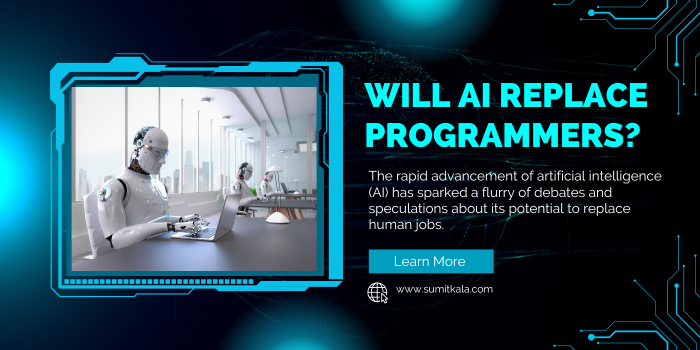
Will Ai Replace Programmers?

The rapid advancement of artificial intelligence (AI) has sparked a flurry of debates and speculations about its potential to replace human jobs. Among the professions under scrutiny, software development and programming have not been immune to these discussions. Will AI replace programmers? It's a question on the minds of many in the tech industry and beyond. In this blog, we'll explore the current state of AI in programming and discuss the possibilities, challenges, and implications of AI's role in the future of coding.
The Current State of AI in Programming
Before diving into the future, it's essential to understand where AI stands in the realm of programming today. AI has already made significant inroads in assisting developers, streamlining specific tasks, and enhancing coding processes:
Code Autocompletion: AI-powered code editors, like Visual Studio Code with IntelliSense or GitHub Copilot, offer intelligent code suggestions as you type. These tools analyze context and patterns to suggest code snippets, reducing coding errors and speeding up development.
Code Generation: AI models can generate code based on natural language descriptions for specific tasks. Tools like GPT-3 can convert human-readable instructions into functional code snippets.
Debugging and Testing: AI-powered testing frameworks can automatically identify and fix code bugs, while AI-driven test generation tools can create test cases to improve code coverage.
Code Review and Analysis: AI can assist in code review by identifying potential security vulnerabilities, coding style violations, and other issues.
Predictive Maintenance: AI can help predict and prevent hardware failures and software glitches in IoT and embedded systems, reducing downtime.
Challenges and Limitations
While AI has made impressive strides in assisting programmers, there are several challenges and limitations to consider:
Creativity and Problem-Solving: AI lacks humans' creative thinking and problem-solving abilities. It can generate code based on patterns and data but may struggle with innovative solutions or understanding the broader context of a project.
Domain-Specific Knowledge: AI may not have expertise in niche domains or industries, making it less suitable for specialized programming tasks.
Ethical and Legal Concerns: AI-generated code can introduce ethical and legal challenges, such as copyright and intellectual property issues or the unintentional propagation of biases present in training data.
Dependence on Data Quality: AI models heavily depend on the quality and diversity of the data they are trained on. Biased or incomplete data can lead to erroneous code generation.
The Future of Programming with AI
AI is unlikely to replace programmers entirely, but its role in software development is set to expand. Here's what the future of programming with AI may look like:
Augmentation, Not Replacement: AI will continue to augment the work of programmers, automating repetitive tasks and increasing productivity. Developers will focus more on designing solutions, architecture, and problem-solving.
Enhanced Collaboration: Developers and AI tools will work hand-in-hand, fostering collaboration. Developers will provide high-level guidance, while AI will handle the details.
Democratization of Programming: AI-powered code generation will make programming more accessible to non-technical individuals, enabling them to create software with less coding knowledge.
New Roles and Skillsets: As AI takes over routine tasks, programmers may evolve into roles emphasizing creativity, problem-solving, and domain expertise.
Ethical and Responsible AI: The development and use of AI in programming will require ethical considerations, responsible training, and transparency to ensure software integrity.
Conclusion
Will AI replace programmers? The answer is a nuanced one. While AI is transforming the programming landscape by automating specific tasks, it is unlikely to return the human touch in software development entirely. Programmers will continue to play a crucial role in designing, guiding, and ensuring software development's ethical and creative aspects. Embracing AI as a powerful tool for coding is the way forward, allowing developers to focus on innovation and solving complex problems. At the same time, AI handles the mundane and repetitive aspects of coding. The future of programming is not about replacing programmers but empowering them to achieve even greater heights.
Appreciate the creator